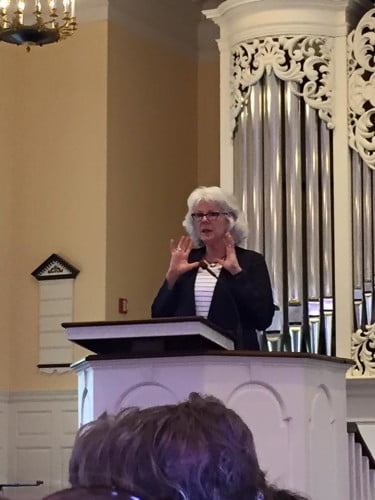 This week, I attended the inaugural writing workshop of the Frederick Buechner Center at Princeton University. I was excited to re-connect with pastoral colleagues and hear one of my preaching sheros, Barbara Brown Taylor talk about writing.
This week, I attended the inaugural writing workshop of the Frederick Buechner Center at Princeton University. I was excited to re-connect with pastoral colleagues and hear one of my preaching sheros, Barbara Brown Taylor talk about writing.
During the Q&A time of Taylor’s last morning lecture on telling the truth in writing (great topic, right?), she responded to a question from the audience.
She talked about how nervous this speaking engagement made her: “Really the first Buechner lectures? No pressure, really? . . . Well, I did it. And, now and I’m so glad it’s over.”
You should have seen the huge grins that filled the faces in the pews.
We knew she didn’t have to say this. She was Barbara Brown Taylor after all! We hung on her eloquent sentences and well-coordinated hand gestures.
But, BBT felt anxiety about speaking at Princeton?
But, you and I live in a world of gaps where super human labels are the norm.
Teacher, student.
Mentor, mentee.
Parent, child.
We get stuck in these places, these roles.
We allow ravines to divide us and fill the gap with expectations, convention and keeping everything nicely polished on LinkedIn.
We fill the gap with tears wiped away too soon while proclaiming, “I wouldn’t want to scare her.”
We fill the gap with reliance on being “all-knowing” so that our grown-up card isn’t suddenly yanked.
And we let our shiniest parts be known.
Our degrees.
Our clean houses.
Our biggest accomplishments at work.
We put away our insecurities, our fears and our deepest complexities in the attic, next to that Christmas decoration box we only get down once a year.

(And leaping the into the vulnerability ravine).
On Wednesday at lunch, I sat with a pastoral colleague, woman who was becoming a new friend. Our stories of child loss rose to the surface. We both knew a God who did not heal, who made us angry, and whose “perfect plans” felt unfair at the deepest levels.
We both cried for the gut-wrenching loss that feels so invisible to most and what it means to live in a world that doesn’t acknowledge our way of mothering.
Later, my friend said, “Thank you for sharing your pain with me. You don’t know how good it was to know someone who has felt all of those things too.”
I took a deep breath in thanksgiving of how the gap closed so quickly from a stranger to a friend. Our willingness to risk talking about our “ugly” brought us this gift.
Not everyone has ears to hear the ugly. Not every audience is open enough to receive our fears.
But what gaps can be closed among us when we don’t try to be so perfect!